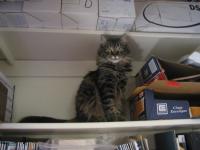May 3, 2009
 click to enlarge
click to enlarge
Our home office is in the second bedroom, where we’ve removed the closet doors and added storage shelves. As soon as she was big enough to jump that high, Tara began insisting that one particular spot, on a shelf at about my eye level, was hers. She started pushing things out of the way, and wouldn’t leave it alone. Finally I gave in and cleared a space for her. (The shelf doesn’t really sag, that’s a trick of the lens.)
She’s asleep there right now, so shhh!
Cats always know their place. Humans can only get out of the way.
— Barbara @ 5:04 pm PST, 05/03/09
April 13, 2009
I’ve been in a horribly bad mood, mainly due to family troubles of the kind that make me feel helpless and small — the news of the death of my oldest brother, and my dad’s loss of independence due to a stroke. I’ve also had some just silly bad luck at home, little things like stubbing a toe so hard a few days ago that I worried it was broken (it’s still sore), straining my back lifting a bag of cat litter yesterday, frustration over the economic crunch that everyone is feeling, when I really could use a newer more reliable car. Why is it that bad news and events seem to come in these overwhelming groupings that feel as if they’ll never end — or, if that isn’t what’s happening, why is it that my mind seems to make even the small problems feel big, once it starts on a downward spiral?
Today I knew I needed to crawl out of this hole I found myself in. I’ve been avoiding the news, because that usually just makes me feel worse, and worse was definitely not what I needed. I know some people think that’s an unrealistic attitude, but I find the news unrealistic, in its focus on everything bad and very little good except nonsensical news about the personal lives of celebrities — people who would likely just as soon be left alone when it comes to personal matters.
I decided to search for some positive news on the Internet, and I found this story on a blog called Great Pet Net that I thought I should share in case anyone else could use a lift: Jasmine the Mother Theresa Greyhound. Dogs tend to have a healing way about them, all around, in my opinion. But this one is exceptional. She certainly had a distant healing effect on me.
It’s a beautiful spring day here. Flowers are blooming, in spite of the gopher that keeps eating them. (Our gopher loves California poppies and nasturtiums. What does yours like?) The The Hooded Orioles arrived early from Mexico, and one almost flew right into me yesterday, maybe because I was wearing green and blended with the plants. Later I watched three Red-tailed Hawks circle the sky above our house. Clouds sail across the sky today in a stiff, delicious ocean breeze. My cat Tara is always up for a game of chase or a tumble with toys. Someone I care about is playing Bach on the piano in the next room.
Yesterday I spotted a long, sinuous cloud in the western sky that looked like a Japanese dragon. I didn’t get a picture, but if you’re familiar with the animated film, Spirited Away, it looked a lot like Haku in his natural form as a river spirit.
Now that I’ve set my mind back in its more customary direction, at least for the moment, good things are beginning to happen inside me again, too.
Every now and then I find it necessary to keep a gratitude journal, to find at least three things each day that I’m grateful for to write about. I think I’ll take up that practice again for a while.
— Barbara @ 4:30 pm PST, 04/13/09
March 27, 2009
We have crane flies like crazy here right now. I’ve always called them mosquito hawks, but apparently they don’t eat mosquitoes (and we’ve already had a few of those).
Tara’s pretty good at catching bugs. She loves to chase the crane flies that get into the house. I’m not sure which is worse, though, pesky crane flies, or a flying cat. She’ll leap, climb, or fly wherever in the house she needs to go in order to catch one. She got so busy hunting them a few nights ago that she didn’t even eat the chicken I gave her. They must be very tasty bugs.
Fortunately I stowed most of our breakables away when she was smaller, because now she’s a force to be reckoned with when she goes flying through the house after a bug. It’s almost like having a monkey on the premises. An eight-pound fur ball flying at you is no laughing matter. She proved that a few days ago when she knocked over my office chair. I wasn’t in it, I just came running when I heard the crash from the other room, and found the chair lying on its back on the floor with one of its adjustment knobs broken off. I think it had something to do with a running, flying leap into it from front to back. A few days later she tried to knock me over, seated in the chair, with an unbelievably football-like tackle for one so small. No claws were used, it was all in fun, of course, but what a cat. I think her Siamese is showing.
Mice beware. Do not enter here.
— Barbara @ 11:57 am PST, 03/27/09
February 6, 2009
It doesn’t seem possible that we can already be one month and six days into 2009. I’ve been posting so infrequently that the blog barely has a pulse. But it is alive I assure you. It’s just been sleeping, dreaming if you will.
It’s raining and stormy today and I’m grateful for that. I think this is only our fourth big rain of the season so far. My cat Tara had a bath a few days ago on a warm, sunny, dry day that got to 80 degrees and seems to have become typical weather this winter. At least it’s been easy on the heating bill. Not so easy on the water bill or my sinuses.
I’ve been away from blogs except to post my ramblings about Tarot at Spirit Blooms. I’ve worked off-line at my other computer on artwork, read or posted on a couple of favorite Internet forums (more than I should), and searched out alternatives on- and off-line to spending money that I don’t have on books that I dearly want. I started out reading about Carl Gustav Jung; now I’m reading the writings of Jung himself, beginning with his autobiography written late in life, Memories, Dreams, Reflections . Still deep in my J. R. R. Tolkien adventure, I recently finished reading The Annotated Hobbit, and now I’m savoring The Lord of the Rings. I’m a little shocked by how much watching the movies in the interim has botched my memory of the original story. Still they’re excellent movies. One should appreciate each on its own merits, the novel and the movies as separate creative entities. To do the written story complete justice there would’ve had to be nine or more movies instead of three. Not that I would complain, but not everyone is the Tolkien fiend that I am. Up ahead I plan to continue with The Silmarillion
. Still deep in my J. R. R. Tolkien adventure, I recently finished reading The Annotated Hobbit, and now I’m savoring The Lord of the Rings. I’m a little shocked by how much watching the movies in the interim has botched my memory of the original story. Still they’re excellent movies. One should appreciate each on its own merits, the novel and the movies as separate creative entities. To do the written story complete justice there would’ve had to be nine or more movies instead of three. Not that I would complain, but not everyone is the Tolkien fiend that I am. Up ahead I plan to continue with The Silmarillion and The Children of Hurin. Perhaps others, who knows? I’m taking my time, reading mostly late in the evening before sleep, if I’m not too tired by then.
and The Children of Hurin. Perhaps others, who knows? I’m taking my time, reading mostly late in the evening before sleep, if I’m not too tired by then.
Eric Mayer mentioned, in his comment on my earlier post about rereading favorites, that he almost never rereads books. I’ve been the same way most of my adult life. I reread a lot when I was a teen and young adult, but at some point I realized there was plenty in print to read the first time around, and life was short. I felt that I’d miss out on too many other things if I spent my time rereading favorites.
I’ve changed my attitude about that again only recently. This has to do partly with some of the newer fiction that I’ve been dissatisfied with, partly with my budget, and partly with the tiny library here in town where the tastes of the librarians don’t seem to mesh with my own — or I’m just quirky in my reading tastes. I’m sure they have some Tolkien and maybe some Jung, but I’ve come to prefer to take my time and not feel constrained by a return date anyway. I tried writing reviews here for a while, and I found that if the book was a library book I had to return it too quickly, and if I tried to write a review after that, I kept wanting to refer to the book. If I like it, I want it to stay around for a while. I also tried our library’s on-line interconnection with an ebook download system, but that didn’t work for me. Old computer or aging human brain inside user? Either way it didn’t work and I didn’t want to waste time fussing with it. I wanted to read the book. You know, just open a cover and start reading. If something is going to slow me down I want it to be the savor of words.
That brings me to the fourth reason I’ve gotten back into rereading. Mostly it has to do with wanting to read slowly. I’ve given up on reading everything out there. I’ve finally accepted that’s impossible. I’ve decided to hone down my reading list and read what I love — slowly, and as many times as I want.
When I reread an old favorite I don’t have to be in such a hurry to get to the end. I already know how it ends. There is something to the first bloom of a new story, that first time through when it’s a path of discovery, recognition, and suspense. But this time I can pause and enjoy the language along the way, let the suspense build again slowly. My old favorites have language worth pausing for. The more commercial books today tend to be heavy on suspense and bizarre plots and twists, while they seem too often short on the kind of writing I savor. Many feel to me as if they’re written in too much of a hurry, or as if the writer didn’t even like the story he was writing. The secret to great writing, I think, is for the writer to so love the story that he’s reluctant to leave it. Chances are the reader won’t want to leave it either.
But then I’m not a hurrier, never have been. I think it’s too easy to get into an “I’ll miss something if I slow down” mindset in our day and age, though it’s a valid concern to some degree. In the work world, one must hurry enough to show up when needed, and if one slows down one is in danger of not getting important work done, of missing opportunities, or of not being able to do one’s job anymore because one hasn’t kept up with hyperactive technology. There are sometimes valid reasons to hurry. I don’t want the emergency room team to dawdle, or firefighters to take their time arriving at a fire. For readers who want to keep up, there’s such a huge amount being published, in spite of aspiring writers’ concerns that no one is publishing what they write, that it’s easy to think one has no time to reread or to read slowly the first time. There are also such a great number of people who want to be writers that it doesn’t appear we’ll ever have a shortage of reading material, even very good reading material leaving out the bad. It’s a crowded world full of people with something to say, many of them excellent writers.
Still I think we miss out on too much by trying to do or read everything. I’m not well-read, mainly because I’m a slow reader. Maybe that’s why I appreciate books that take a long time to produce. I can sense the love and time that was put into them. I can linger, relish, and wonder why. I can spend a relatively equal time enjoying them, and feel gratitude that the authors took the time to do it right.
Tolkien took something like 13 years to write The Lord of the Rings between 1937 and 1949. He took longer, when one considers all the thought prior to beginning it that he put into creating the world of Middle-Earth, from the time he was a boy, and the time between 1949 and 1954 that he worked with his publisher to get everything just right. That time shows. And it’s not as if by taking that long he missed out on sales, which seem these days so unforgiving of anyone lagging behind. The only time any of his books went out of print was during Word War II and the after-war years, when paper was rationed in England. Oh, and there was the problem of some proofs being destroyed in a bombing or a fire (I don’t remember which) that caused further delay in getting one edition of The Hobbit back into print. Of course one important factor in his print longevity was in being Tolkien. There have been many imitators and, as Eric seemed to hint in his comment, most imitations have not held up very well. Time is, I think, one reason.
I’m certain that the biggest problems with many books is that they’re devised and written in too much of a hurry, and because they aren’t true to the writer’s own creative promptings. I can see some publisher urging a writer to create something like Tolkien wrote, but to do it right now. Imitation done in a hurry can rarely hold up to the proper process of creation. Sometimes, but not usually. Imitation as a whole is an iffy and questionable practice. Readers may say they want another story like The Lord of the Rings, but they’re not saying they want an imitation. They want more Tolkien, and that’s simply the best possible compliment to the original creator, not to any would-be imitator. Perhaps we sometimes, as readers, make the mistake of confusing the two ideas ourselves and go looking for another Tolkien when we should be looking for something else that’s new and fresh, and over which someone labored long and lovingly.
It’s been said that most of a writer’s work doesn’t take place at the typewriter or keyboard, or even necessarily with paper in hand. It happens inside the mind of the writer. I personally think every writer’s workspace needs a comfy couch, or a bed, and a window with a view of a natural setting or garden, as well as an immense library. I also think it’s safe to say that most great fiction writers have lived what they write. By that I don’t mean they’ve experienced it in physical reality. I mean they have a fertile and active imagination, an ability to visualize the experiences they haven’t actually lived. A relentless imagination at that. We use our imaginations to read, but the writer uses his imagination far more, over and over again, actively reliving the scenes he writes in his mind, working them out until they feel right, until he’s ready to translate them into written language. They get to know their own unconscious realms and facets of their own characters, as well as the archetypes of the collective unconscious, even more than we do ordinarily when we dream at night.
Now I know that some writers create at the keyboard on the fly. I’ve done that too. But the stories I’ve written that I felt best about were usually those that I had in mind for a long time before I dared to put any words down. They were an integrated collection of many things that occurred to me, including some fantasies, day dreams, things I wondered about, and even whole scenes, characters, or settings that occupied my mind well before I realized they’d formed anything close to a story worth sharing or writing down. Some were ideas I couldn’t put away because they begged to be told.
Fast writing may be part of the problem. I once rewrote a novel (Snow Angels) in the course of a few weeks, retyped the whole thing from scratch, from my head. But that story had been in my mind for a long time, in various forms, and even on paper in a few forms, before I did that. I’ve never taken part in NaNoWriMo, but I think it is possible for it to produce something of value, provided there’s something already percolating in the writer’s mind before they begin, perhaps for years before they begin typing it out. I’ve done fast writing exercises, and I know they have their value. But I wonder if the trend in fast writing is the reason so many new books I read leave me flat these days.
There is fast writing that’s great, and there have been many great prolific writers. But if we make the mistake of thinking their greatness lay in their proliferation, we do them a disservice. The secret to great writing also doesn’t lie in taking forever to produce something. I’m sure there are plenty of slowly written pieces of rubbish passing for fiction. But prolific writers are the exceptions to the slow writing rule, I think, and like Mozart’s music, great fast writing is great for other reasons than its speed of production or lack of revision. Of course everyone should write at their own speed, but fast writing of a single draft usually requires slow thinking up front, and long, slow revisions afterward. If one doesn’t take the time to do it right, to follow through, to consider it worth some effort, then even that smaller portion of fast writing time is wasted, not to mention the time anyone else takes to read the result. If it’s not worth spending lots of time writing, then maybe it’s not worth reading either.
In spite of how long Tolkien’s work has remained in print, it’s still possible that work of this kind is best done for oneself, with any idea or intent of publishing as a mere afterthought. One should, after all, consider oneself worth writing well and respectfully for. From what I understand of Tolkien, he only shared what he created with a few colleagues, friends, and his children, until the friend of a friend mentioned the possibility of publishing The Hobbit. Maybe that’s why it’s so good. He took time to shape and polish it to be what he wanted for himself and those he loved. Only after that did he shape and polish it for publication. Surely that provided him a great deal of satisfaction in what he wrote, regardless of whether strangers in his own land or across the pond liked it later on. He was also a real-life expert regarding myths of a world similar to the one he created and regarding the language he used to create it. But was he an expert who happened to come up with a story he was best suited to write, or was he a writer in the making, even as a child, who lived in his head creating a world first and who worked all his life to become expert at just what he needed to recreate that world on paper? Either way, he took his loving time about it, and that’s a good thing for all of us. After all, what’s the rush?
— Barbara @ 1:55 pm PST, 02/06/09
January 11, 2009
I’m rereading a favorite book in a new form, and watching some old TV shows I’d forgotten were so good, so it’s been a week of favorites for me and I thought I’d share.
I’m also a little desperate for something to blog about, and I must be growing jaded, because my favorites are old, and sadly far too few.
Favorite Books:
J.R.R. Tolkien’s The Hobbit and The Lord of the Rings. I’m currently reading The Annotated Hobbit, an edition annotated by Douglas A. Anderson. I’m loving it, though I think most of the annotations will be something to enjoy on my second reading of this edition. It’s been so long since I read the story, that I find myself just sticking to the story and not reading footnotes (marginal notes in this case). But I did read the introduction, and immersed myself in some fascinating biographical and publishing history. Now and then my gaze veers into the margins and my curiosity is piqued.
I decided to read this story again because I’ve read that Peter Jackson is finally involved in a film adaptation of it, which I’ve looked forward to ever since the LOTR trilogy that he produced and directed. This time I want to view the film adaptation fresh from the written story, rather than from the perspective of more than a decade of fogging over of my memory as I did with the trilogy. Which means I’m reading it now and likely will read it at least once more before the film is released.
I’m also rereading this, and plan to reread LOTR, because the film trilogy has become a mini-obsession of mine and yet every time I watch the movies I keep thinking how much I want to read the books again.
Tolkien is easily my most favorite author, ever. I’d be hard pressed to name a second favorite who comes anywhere close. Maybe it was his relationship to language, as a philologist. He also had a deep, abiding love of the fairy story and ancient poems and songs. (Many of his dwarves’ names are borrowed from the Elder Edda.) I like that he was unapologetic about his errors. He didn’t try to hide them and, if it made sense he fixed them in later editions. If fixing them didn’t make sense, he lived with them without shame or excuse. He was still a teen when he began to create his own language, that of the elves that he used in his stories, incorporated so elegantly into the film version of LOTR a few years ago. Tolkien wrote circles around anyone else, and almost singlehandedly invented the modern fantasy genre. He seems to have recalled something both childlike and ancient, and filled it with something else profoundly basic to humanity, all of which make him seem himself to have been a wizard — of storytelling. Stories are his version of Gandalf’s fireworks, and even of Gandalf’s defeat of the Balrog and death. Tolkien is pretty much at the top of the mountain and well beyond compare, in my opinion. All the rest, even my other favorite authors, are still down there in base camp, wondering about the weather up there on high. Keeping in mind that when climbing the highest mountains in the world, just getting to base camp is something, nothing to sneeze at. Most of my favorite books that even come close to Tolkien’s, though, are older, the authors also long dead.
This makes me wonder if we’re ripe for a literary renaissance. And when I say literary, I mean a STORY renaissance. Preparatory to that, if Tolkien’s work isn’t now required reading in school, I think it should be. I would love to see a new generation fall in love with language and with story.
Favorite TV series:
Star Trek The Next Generation. There’s no comparison, and even viewing old dilapidated recordings of it compares favorably, in fact stunningly so, to most of what I see on TV today.
I was saddened to hear of the death last month of Majel Barrett, and I felt as if her death marked the end of an era (started by her husband, Gene Roddenberry) in science fiction and in television.
While watching old Star Trek TNG episodes, I can’t believe how often I have to reach for tissues because a story line touched me deeply, or I’m still amused by the always tasteful humor some 20 years later, or I’m struck dumb by a profound insight or bit of ageless wisdom. At the same time it’s immensely entertaining, and frequently filled with suspense. There’s nothing like it.
I have a second favorite TV series — actually two sister ones: Stargate SG-1 and Stargate Atlantis. Still, Star Trek the Next Generation is another top of the mountain favorite that is difficult to compare to anything. Who knows, Tolkien himself might even have loved it.
I like The Closer, mainly because the female lead is a character, someone I can relate to. She’s over thirty and still attractive, but it’s not in-your-face plasticized starlet attractiveness. Kyra Sedgwick is beautiful in a way that goes beyond starlet appeal, and you get the impression this is a woman who’s actually honest-to-god aging and struggling to maintain, rather than magically stopping time until the powers that be disappear her from TV as soon as she shows signs of (horrors!) appearing to be over forty. She holds her own in a man’s world without needing to act like a tough chick. She’s spunky and vulnerable, and she doesn’t have to show us the inside of the body as the bullet passes through it for cheap thrills, or make us help examine the vomit under a microscope or eat bugs (honestly, some TV cannot be viewed while enjoying dinner), or be right there for the bloodiest new surgical procedure of the century, spurting arteries and all. I need some mystique left in my mysteries, some characters I can relate to, and not to feel as if I have to learn how not to be squeamish along with the interns in my medical shows. I also wonder why there are so interminably many “realistic” detective and medical shows. Isn’t there anything else to write about, guys? Is the sitcom dead? I guess so.
I like Ghost Whisperer, though I’ve discovered it only recently, so we’ll see how that works out.
I liked Dead Zone, until they killed off Walt the sheriff. I thought he provided an important obstacle between Johnny and his former love, Sarah. Conflict in the form of strong romantic and other obstacles is critical to good series fiction, even a paranormal series that has a new problem to solve each episode. Without the core conflicts and tension to fall back on, a series falls flat because no one seems to be trying very hard, day to day. They’re just biding time until the next psychic flash, murder, ghost, mystery disease, or demon appears. A good series has several backup sources of tension. In Star Trek TNG, nearly every character has a known source of personal conflict that’s always simmering just under the surface, and the series as a whole is full of those tensions sometimes rising, and frequently interacting with others’ conflicts. Killing Walt off, in The Dead Zone, was like letting Marshall Dillon marry Miss Kitty, or letting The Fugitive catch the one-armed man. You just don’t do that, until the very last episode ever. The End.
All that said, I would be hard pressed to come up with new series or episodes from season to season and week to week as the best TV writers do.
Maybe we need a television renaissance as well as a literary one.
Barring that, we may need to let all the Marshall Dillons marry all the Miss Kittys in a big Sun Myung Moon style wedding — and then give TV one big funeral service and be done with it. Most of the shows are so lame, and the commercial breaks are so long these days, that I frequently leave the room to finish the dishes, make a snack, or check my email, and then lose interest and forget to return to see how the show ends. They say there’s nothing new under the sun, and television, as a whole, seems to be trying awfully hard to prove it.
Do you have any new/old favorites to share? What entertains you these days?
— Barbara @ 9:34 pm PST, 01/11/09
July 8, 2008
Our summer weather has set in, likely until mid to late October, so I have to wake up early to get all my outdoor work done. I’m amazed how fast things can grow in the warm weather and get away from me — mostly things I don’t want to grow, like weeds.
My usual care to wear gloves when working in the yard had lapsed recently, but working outside earlier than usual this morning meant that I happened across two black widow spiders. One, on the lower rock wall, was attempting to kill a big iridescent green June Beetle, or what we call a June Beetle here, aka Fig Eater Beetle. The beetle was 10 to 15 times the spider’s size. Their struggle mesmerized me for a moment as I wondered who would win, the beetle snapping spider silk as quickly as it wrapped around it. It was the noise he made that drew my attention in the first place. I would’ve intervened, if I’d had something handy to kill the spider with, but the next time I walked past, the spider — hiding from me, no doubt — was nowhere to be seen and the beetle was bumbling away. I’ll be more careful to wear gloves and not work in flip-flops anymore, unless I’m only watering. Black widows usually hide from people, but I don’t want to surprise one.
My little friend Tara is growing fast. A kitten in the house means lots of interruptions to play, or to stop misbehavior in its tracks, or just to cuddle. I’ll try to post an updated photo later, but it might be a blur unless I catch her when she slows down to nap, bask in a sunny window, or watch TV. She’s now more than three times the size she was when I took these pictures, and darker since her kitten fluff has been replaced by a true dark tabby coat. She’s a Siamese mix, but you wouldn’t know that to look at her.
Tara watched Mikhail Baryshnikov dance, in an older video on the arts channel last night, and I think she decided he’s the most cat-like human she’s seen. I hope she doesn’t expect us to move like that! But maybe it’s good that she knows some humans are capable of it, just to help us keep the upper hand. Sometimes we call her Rocket Cat, and one day recently, as the dog and I watched in glazed over amazement while she raced around and up and down a room, I commented to him, “You know, cats can almost fly.” Indi seemed to agree.
I’m not really sure what all else keeps me busy, but there’s a lot of it, whatever it is. I don’t work in the garden enough to excuse not blogging, but I do spend some time finding things to do with the excess produce.
We’ve had loads of squash from just four plants, so far, some of it now in the freezer and some given away. We may need a bigger freezer if I keep gardening. One way that we like zucchini is simply sautéed in a little olive oil with basil, oregano, salt, and pepper. We’ve had some cucumbers, which I personally think would make a good breakfast food, because just one bite seems to wake me up with its fresh, clean crispness. The tomatoes got a late start (from seed), so we haven’t had any to eat yet, but they’re blooming and setting fruit, growing like mad in the heat. There’s a San Marzano Roma about the size of the end of my thumb that I predict will be the first to the table, unless that little cluster of marble sized cherry tomatoes beats it to perfect redness. With the salmonella scare still pretty much a mystery I’m looking forward, even more than I expected when I planted them, to fresh homegrown tomatoes.
Yesterday we discovered how well extra garden produce can pay off, when we gave a large zucchini to a neighbor boy to take home, and later his mom sent over four of the most perfect little quesadillas I’ve ever tasted. Oh. My. God. These were not the quesadillas you find in Mexican restaurants, or the floppy things we usually concoct with flour tortillas and cheddar cheese, in a skillet. Every part of hers was homemade, including flaky six-inch corn flour shells folded in half and crisped. They were filled with chicken, some kind of white cheese, possibly one of the Mexican cheeses described here, and fresh cabbage, and they came with a magical homemade chili sauce to pour over them. I am positive we got the better end of that exchange. You can’t get food like that in any restaurant, and I’m in heaven just remembering them. It’s odd how a really good hot sauce can actually cool you. As my mouth heated up, my body seemed to cool right off. Must’ve been all my pores and sinuses opening. It was positively delicious. Mmmmh!
— Barbara @ 12:49 pm PST, 07/08/08
April 18, 2008
No, I did not mis-spell “sweater” in the title. We’re having a summery spring, with hot, dry Santa Ana conditions interspersed with normal spring weather, and it’s confusing our poor little seedlings.
I’m actually doing a tiny bit of gardening. Though I’m a plant — especially flower — lover, and I’ve hankered for some fresh garden produce for a long time, I’m shamefully lazy at doing anything about it. Any yard we’ve had that looked good in the past was entirely my spouse’s doing, except for a little weeding here and there on my part, and even now with my surge of interest in finally getting a real garden started here, I’m quite a bit lazier than he is. I’m much better at mental or creative, sedentary work than physical labor. But I’ve had my bursts of productive activity too, and I’ve gotten a little spring cleaning done indoors as well. Not enough to suit me just yet. There’s a lot of catching up to do around here. Thus my long absence, which has been partly rest periods due to the early lapses into summer. Hot weather tends to make me just want to lie down in a dark room with an icy drink of something and whine about the heat. When the thermometer rises above 80 degrees Fahrenheit, my brain even seems to go on vacation. Hopefully that helps explain the long absence from blogs — mine and yours.
How’s your spring going so far?
Had any summer yet?
Want some of mine?
— Barbara @ 4:00 pm PST, 04/18/08
September 2, 2007
When I stopped commuting to a busy office and switched to staying home most days, I worried a little whether my new life would be too quiet or uneventful to suit me. But I’m never bored, and I’m sometimes amazed how much can happen right outside my door. I’ve been able to slow down, tune into the seasons, and let them slide gently past. I can be a mushroom, staying indoors and focusing on my inner world, as writers do when we’re working, or I can step right outside and find endless variety, especially in the forms nature takes.
I posted earlier this summer about hummingbirds. There have been lots of birds this summer. The mockingbirds twirled in cartwheel displays, showing off the white of their wings, and flew in wild, veering trajectories to catch cabbage white butterflies. They sang for hours on end, and swooped at anyone who ventured within range of their nests. A nearby rooster crows most mornings and sometimes all day. I’ve seen a phainopepla, a few hawks, loads of crows, orioles, black phoebes, brown towhees, and house finches. My husband saw a California thrasher, who sadly chose a rare time when I was at the post office to stop by for a snack of insects. Now and then a flock of common bushtits flies through, chittering in light tones. They never seem to sit still, and I like their tiny, perfect round shapes, so like the birds in picture books that I read as a child.
We’ve seen butterflies of all varieties this year, as well as plenty of bees, lizards, bats, and the tarantula hawk, and the summer has seen a variety of mushrooms sprouting in the yard, which seem to be able to blend in with their surroundings. (Click on images to view full size.)


Our daily visitors include the ubiquitous scrub jay.

I’ve noticed that a variety of clouds can inhabit different parts of the sky in the same moment.


I even got to thinking about the little fuzzy-edged ones, and wondered if painters who pour watercolor ever pour white gouache to make clouds. That sent me on a lazy search that introduced me to the work of artist Vickie Leigh Krudwig.
We’ve had our hottest weather of the year in the past two days, and today promises to be even hotter. Thirty minutes ago it was 97 degrees Fahrenheit outside. As I write this, it’s 99. Yesterday’s sighting of a swallowtail butterfly almost as big as my hand, and this morning’s sunrise, almost make up for the heat.


I’m attempting to ignore the fact that the sunrise was followed a few hours later by a 4.0 earthquake about 40 miles north of us, which jolted us to our feet. As I write this, thunderheads are forming just east, which looked like this an hour ago,

and like this half an hour later.

I don’t expect a triple whammy day of heat, earthquake, and thunderstorms. I’m looking for the next butterfly. But I may close the car windows just in case.
— Barbara @ 1:35 pm PST, 09/02/07
July 9, 2007
Gloria Steinem: In Defense of the ‘Chick Flick’:
“I propose, as the opposite of “chick flick,” films called “prick flicks.” Not only will it serve film critics well, but its variants will add to the literary lexicon.” (read article)
Maybe the term “prick” is too strong. It’s not the word I would’ve chosen, yet it answers the fact that a lot of women are put off by the tone and expression, if not the word, used when we hear the term “chick flick.”
Steinem’s editorial reminds me of something that occurred in a “Modern Fantasy” literature class I took, back in the seventies, when Mary Stewart’s first two Merlin and Arthur novels, The Crystal Cave and The Hollow Hills, were recent bestsellers. One of the young men in the class was so taken with them, he asked what other books Mary Stewart had written. I told him she’d written mostly romantic suspense in the past. I had an entire collection of her books at home, older hardcover editions gleaned from thrift store shelves. I thought when he expressed an interest that here was another new fan. But when the young man heard the word “romantic,” he took on a look of utter distaste and lost interest.
Some female mystery novelists still publish today using their first and middle initials rather than their full first names, in order to stretch past that still-existent gender barrier in many male readers’ minds, a practice reminiscent of the Brontës publishing under masculine names. One would’ve hoped that by the time this century rolled around we’d have advanced further. I don’t have statistics on this, but I’ll hazard a guess that there are more women who read and write fiction containing a predominately masculine point of view than there are men who read or write fiction containing a predominately feminine point of view.
Yet I know women, myself included, who enjoy a good action film, of the type once considered a favorite of men. Why is it that women, both in their reading and writing, as well as in movie preferences, might more readily cross old gender barriers?
Mind you, many men do take an equal interest in less violent or less action-oriented movies and books, and I admire men who are open to genres and interests considered historically feminine. I also admire women who open up more to interests previously considered masculine. More women today are sports fans than ever before, and don’t restrict their interests, as I do, to figure skating. My lack of interest is mostly due to bad experiences in physical education classes — I was that awkward, non-athletic kid always picked last for the team. It has nothing to do with my admiration of any outstanding achievement, physical or otherwise, and I enjoy watching good sports-related movies.
What is it that continues to keep some men from enjoying what they term as “chick flicks?” Is it that they truly don’t enjoy more thoughtful, slower-moving, or less action-oriented stories, once they give them a chance? Or is there another reason? Is it adrenaline addiction? (Understandable, among men and women, in today’s world, though perhaps best not encouraged.) Is it fear of what their friends will think? I’m trying not to make assumptions here. I’d really like to know, especially as a female writer trying to sell my fiction.
We all have types of stories we don’t like, or even parts of movies we like that we could do without. I personally back away from anything about child abductions, gangster movies that are overly violent onscreen, comedies that resort to tasteless bathroom humor (bathrooms have doors for a reason), and horror with too much blood and gore added for shock value. As far as I’m concerned, vomit and excrement belong off-screen. There’s enough of them in real life, and they’re not entertaining. They’re certainly not the kind of realism I’m looking for in a story.
I can understand someone not liking romance, even though I usually enjoy it provided it’s not overly sappy. But no one’s personal preference for certain types of stories and not others explains why we need the term “chick flick,” and especially not why it so often seems to be used as a derogatory term. Do the men who don’t like “chick flicks” prefer movies with only men? Is that what it boils down to?
I’m reminded of a line from Frank Herbert’s Dune regarding taking the “waters of life.” It mentions the place in their minds the Bene Gesserit mother superiors (women) fear to go, a place they believe only the fabled Kwisatz Haderach (a man) can access. The Kwisatz Haderach, once he accesses that place, becomes a superior being destined to lead his people to freedom. I wonder about the allegory Herbert intended, if any. Is there a place like that inside the female psyche, where some of the toughest men fear to go? Is that what they fear about “chick flicks?” Will they gain power if they find a way to access that, or will they lose power, possibly even die, as many men did who attempted to become the Kwisatz Haderach? Or will they simply gain a broader understanding of life and the world around them? In that case, maybe it’s worth a shot.
Gloria Steinem makes an interesting observation about power, and about nouns and adjectives in labels:
“Just as there are “novelists” and then “women novelists,” there are “movies” and then “chick flicks.” Whoever is in power takes over the noun — and the norm — while the less powerful get an adjective. Thus, we read about “African American doctors” but not “European American doctors,” “Hispanic leaders” but not “Anglo leaders,” “gay soldiers” but not “heterosexual soldiers,” and so on.” (read article)
— Barbara @ 1:35 pm PST, 07/09/07
July 4, 2007
Reenie got me thinking about critiques today, specifically peer critiques of fiction.
As a technical writer and editor, I used to give and take strong, pointed, and mind-numbingly detailed critiques. That made sense, because what my coworkers and I wrote sometimes involved life or death safety procedures, or processes in which expensive equipment could be damaged if something wasn’t done right. We had to be precise, and could not leave room for interpretation or confuse anyone. There was no gray area. So I steeled myself and went through the review process. I found I could keep my emotions completely out of it, because I knew what was at stake, and it wasn’t about me. I always learned something.
Fiction is different — except that part about always learning something. (more…)
— Barbara @ 4:17 pm PST, 07/04/07














